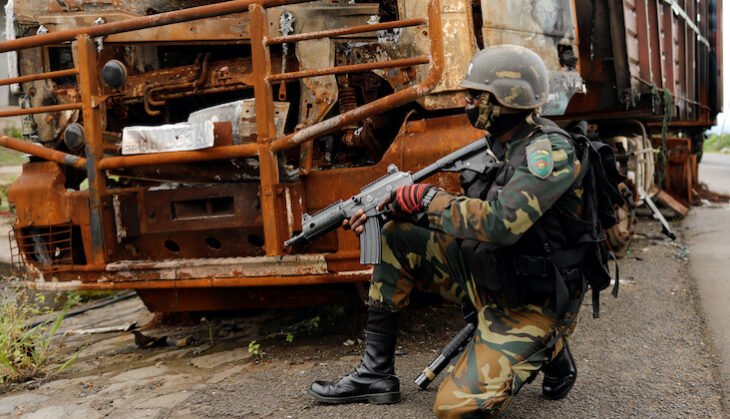By Jeune Afrique
Peace talks involving the government of Cameroon and Anglophone separatists are at a standstill due to a power struggle playing out between prime minister Joseph Dion Ngute and secretary general of the presidency Ferdinand Ngoh Ngoh.
On 2 July, the jailed secessionist leader Sisiku Ayuk Tabe announced on social media that he had taken part in discussions with Cameroon’s government regarding a ceasefire agreement under the auspices of the United Nations.
Subsequently, on the orders of secretary general of the presidency Ferdinand Ngoh Ngoh, communications minister René Emmanuel Sadi said in a statement that this information was not “accurate”. Since then, the two parties have not been in further contact with one another.
Church provides neutral grounds
However, according to sources, a delegation made up of about 10 secessionist leaders led by Ayuk Tabe did in fact meet on 2 July with Léopold Maxime Eko Eko, head of the Direction Générale de la Recherche Extérieure, Cameroon’s counter-intelligence agency.
Given that the conditions set forth by the Ambazonians included that the meeting take place in a “neutral” setting, the government asked the Catholic Church to allow it to hold the talks at the Episcopal Centre of Mvolyé. Located in Cameroon’s capital, the church was ultimately selected as the site of the negotiations, which were attended by six other government representatives.
At the third such meeting arranged by the government, the duo formed by Dion Ngute and Eko Eko led the administration’s negotiation. A traditional dignitary in the South-West region, the prime minister has a network of local monarchy connections who provides him with a way to engage with separatist rebels.
Eko Eko, a police superintendent and speaker of French and English, was the negotiator who successfully secured the 2008 release of oil workers taken hostage aboard the French vessel Bourbon Sagitta by the Bakassi Freedom Fighters, a rebel group from the Bakassi Peninsula, which Nigeria and Cameroon had disputed.
Secret negotiations
Prior to that, the first meeting with Anglophone leaders had taken place in Ghana, where Eko Eko met with secessionist figures from the diaspora community such as Ebenezer Akwanga and Herbert Boh. The second meeting was held on 13 April in Mvolyé (Yaoundé) and brought together Ayuk Tabe and his allies.
At the end of these talks, some progress was made, as the separatists said they were prepared to abandon their most radical demand, i.e., the departure of Cameroon’s army from the North-West and South-West regions. However, their acceptance of the continued presence of these troops came with the condition that they remain in their barracks since, in their view, the police and gendarmerie forces should be the sole personnel permitted to be deployed on the ground.
Dion Nguté and Eko Eko excluded the rest of the administration from secret negotiations which nevertheless had the blessing of President Paul Biya. Even Ngoh Ngoh was not involved in the discussions, despite the fact that he had been the Swiss government’s primary contact since June 2019.
Yaoundé officially mandated the Swiss government to facilitate talks between the warring sides. Working with the Geneva-based Centre for Humanitarian Dialogue (HD), the Swiss mediators invited several secessionist leaders to participate in a discreet preparatory meeting from 25 to 27 June in Saint-Luc, a small village in the canton of Valais. However, at the end of 2019, the HD-led mediation process ended in failure due to distrust from certain factions of the secessionist movement.
New round of Swiss mediation
After Ngoh Ngoh released a statement by way of Sadi denying that talks had taken place, the Swiss negotiators initiated a new mediation process. On 2 August, a delegation led by Günther Bächler arrived in Yaoundé. The 67-year-old diplomat and former Swiss ambassador to Georgia served as a mediator in conflicts in Darfur, Nepal and in the South Caucasus on behalf of the Swiss Foreign Ministry. As soon as he arrived in Cameroon, Bächler got in touch with a number of people, not just separatists but also supporters of federalism and proponents of decentralisation. On 4 August, he met with Cardinal Christian Tumi. On 6 August in Buea, the capital of the South-West region, the delegation planned to meet with the lawyer Felix Agbor Balla as well as with other local Anglophone figures
